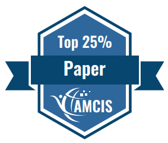SIG PHIL - Philosophy, Psychology, and Sociology of Digital Innovations and Entrepreneurship
Loading...
Paper Type
Complete
Paper Number
1154
Description
This study investigates how supportive social relationships experienced by workers on online working platforms counteract their platform turnover. Keeping workers active and reducing turnover is a key challenge in platform work. Still, to date our knowledge on retaining workers is limited. Organizational literature concludes that supportive organizational environments are strong predictors of reduced turnover. Although platform work lacks organizational social environments, studies shed light on the social context digital platforms do provide within their platform ecosystems. Building on social identity and social exchange theory, I investigate how supportive relationships experienced within this ecosystem reduce platform turnover. Drawing on a two-wave survey with 652 workers, I found that the platform ecosystem’s social support (particularly from the platform provider and from virtual peer communities) shapes workers’ affective commitment to the platform, which reduces turnover intentions. From an ecosystem perspective these findings make several contributions to the social dynamics in platform work.
Recommended Citation
Ihl, Andreas, "Supportive Relationships, Commitment, and Turnover in Platform Work: A Platform Ecosystem Perspective" (2022). AMCIS 2022 Proceedings. 4.
https://aisel.aisnet.org/amcis2022/sig_phil/sig_phil/4
Supportive Relationships, Commitment, and Turnover in Platform Work: A Platform Ecosystem Perspective
This study investigates how supportive social relationships experienced by workers on online working platforms counteract their platform turnover. Keeping workers active and reducing turnover is a key challenge in platform work. Still, to date our knowledge on retaining workers is limited. Organizational literature concludes that supportive organizational environments are strong predictors of reduced turnover. Although platform work lacks organizational social environments, studies shed light on the social context digital platforms do provide within their platform ecosystems. Building on social identity and social exchange theory, I investigate how supportive relationships experienced within this ecosystem reduce platform turnover. Drawing on a two-wave survey with 652 workers, I found that the platform ecosystem’s social support (particularly from the platform provider and from virtual peer communities) shapes workers’ affective commitment to the platform, which reduces turnover intentions. From an ecosystem perspective these findings make several contributions to the social dynamics in platform work.
When commenting on articles, please be friendly, welcoming, respectful and abide by the AIS eLibrary Discussion Thread Code of Conduct posted here.




Comments
SIG Phil